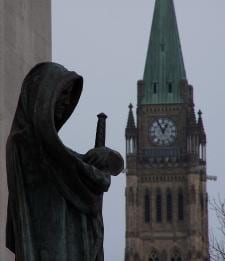British Columbia transit officials violated the Charter right to freedom of expression by refusing to accept political advertisements, the Supreme Court of Canada ruled today.
The ruling is a victory for the BC Teachers’ Federation and the Canadian Federation of Students (CFS). BC transit authorities rejected their ads in 2005 on the grounds that they were too political. Today’s ruling is also good news for atheist groups, as they have been denied transit ad space in several Canadian cities.
Like many transit authorities across the country, BC Transit and TransLink had a policy of refusing political ads of any kind. They also rejected any ads that were “likely, in the light of prevailing community standards, to cause offence… or create controversy.”
The court ruled that authorities can’t place such overt restrictions on political ads, and that excluding ads on the grounds that they may “create controversy” is an unnecessarily broad limit.
“Citizens, including bus riders, are expected to put up with some controversy in a free and democratic society,” wrote Justice Marie Deschamps, in the 8-0 ruling. “The [BC Transit and TransLink] policies amount to a blanket exclusion of a highly valued form of expression in a public location that serves as an important place for public discourse.”
In 2005, BC Transit argued that allowing a Rock the Vote ad sponsored by the CFS would make busses less safe or welcoming for riders. The ad encouraged youth to register and vote in the provincial election.
The court ruled that BC Transit’s argument was out of bounds.
“I have some difficulty seeing how an advertisement on the side of a bus that constitutes political speech might create a safety risk or an unwelcoming environment for transit users,” wrote Justice Deschamps.
Canada’s leading civil liberties group is hailing the decision as one to celebrate. “It means that if government makes available space for people to advertise on, they can’t make it available for some people and not others,” says Rob Holmes, president of the BC Civil Liberties Association (BCCLA).
Across the country, atheist groups were closely watching today’s decision. Earlier this year, Halifax’s Metro Transit rejected an advertisement that read “There’s probably no god” because it might “upset” people. Atheist groups also hit roadblocks or were flat-out rejected when they tried to purchase transit ad space in other cities, including Vancouver, Ottawa and London, Ontario.
Kevin Kindred of the Halifax Atheist Bus Campaign says his group plans to submit an ad to Metro Transit on Monday.
But today’s ruling did leave the door open for government bodies to restrict an ad if they deem that it exceeds the “reasonable limits” that Section 1 of the Charter of Rights and Freedoms gives to free speech — and the BCCLA is concerned that governments will abuse that discretion.
The ruling hinted at specific ways that authorities may be allowed to restrict ads.
“The likelihood of children being present matters, as does the audience’s ability to choose whether to be in the place,” wrote Justice Deschamps. The court referred to a previous ruling on tobacco advertising, which bars those ads from appearing in places frequented or publications read by youth, who the court described as a “vulnerable” group. The court also notes that the Criminal Code standards of public decency still apply.
Governments may “try to invent ‘reasonable limits’ that are not reasonable at all,” says Holmes. The Supremes suggested that ads that encourage violence or discrimination could be regulated, but Holmes suggests that future court cases will revolve around attempts by government bodies to add other reasons for regulating.
“The price of freedom is eternal vigilance,” he says, quoting Thomas Jefferson.

 Why you can trust Xtra
Why you can trust Xtra


